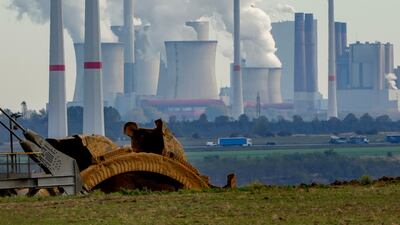Eleven European countries are forming a green alliance to overcome EU climate gridlock and drive more ambitious action.
Germany, France and nine other countries said climate policies were “still falling short” of the transformation needed.
They said they would seek to build alliances with like-minded countries at the upcoming Cop27 climate summit in Egypt.
The EU has proposed a vast package of green reforms known as the European Green Deal aimed at slashing emissions by 2030.
But key elements, such as the role of nuclear power and the future of petrol cars, have been bogged down in divisions among the 27 EU members.
The new, smaller “Group of Friends” said it would seek to speed up the switch to clean energy and embed climate action in the EU’s foreign policy.
Showing leadership on climate change could help Europe ally with a global south often wary of the rich world’s demands, they said.
The new club “is a sign of leadership in mitigation action and solidarity with the most vulnerable,” said Jennifer Morgan, Germany’s special envoy for climate action.
German Foreign Minister Annalena Baerbock said investing in renewable energy was a matter of “hard security policy” because of security risks linked to climate change.
Security officials in many countries describe climate change as a security threat because of its potential to cause conflict in fragile parts of the world.
The new club said it would reinforce this point by drawing up risk assessments of how climate change can threaten peace.
The group “is committed to enhancing co-operation, co-ordination and implementation of ambitious climate diplomacy action” by the EU, members said.
Climate change “is an existential threat to humanity, international peace, and security with millions of people at risk of being displaced from their homes and livelihoods being destroyed,” they said.
“Despite these severe consequences, which are aggravated by the Russian aggression against Ukraine, global climate action is still falling short to achieve the 1.5ºC”, meaning the target of limiting global warming to that level.
Denmark, Finland, France, Germany, Ireland, Latvia, Lithuania, Luxembourg, the Netherlands, Spain and Sweden are members of the club.
German officials are separately working on building a “climate club” of like-minded countries beyond Europe, to escape gridlock in forums such as the UN and G20.


